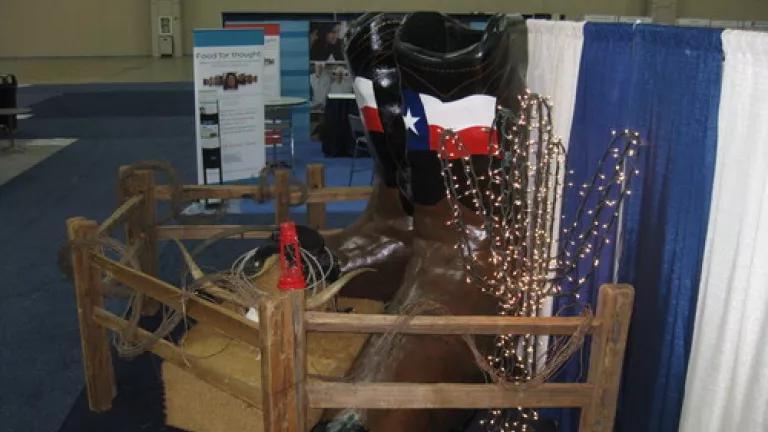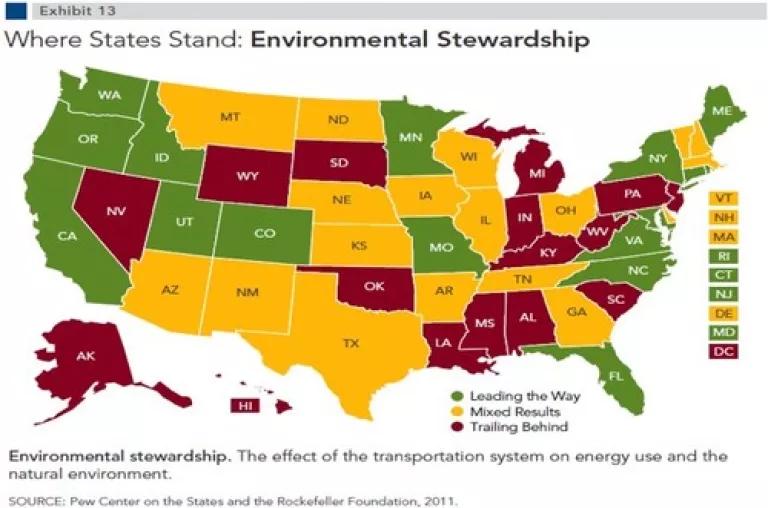
Earlier this week I braved the 100-degree-plus heat in San Antonio, Texas to speak at an energy summit held as part of the National Conference of State Legislatures annual summit. About a thousand legislators and their staff convened for this big event, and the summit itself attracted a hundred or so of them.
While I missed the session featuring Texas Governor Rick Perry (who is coincidentally about to announce his Presidential bid) since I had to get back to my family, I enjoyed a day of animated discussion of biofuels, electric and diesel vehicles and fuel-efficient alternatives such as rail and buses. I also had a chance to check out booths and displays in an exhibit hall, including these enormous (everything's bigger in Texas) boots on display to welcome out-of-staters.
My talk covered the leadership role that states play in driving transportation policy and therefore our national oil dependence (few agencies are more powerful than state departments of transportation). I discussed NRDC's fifth annual ranking of states based on oil addiction and its solutions and provocatively clarified that we really can't drill our way out of this, as the President has said. I was frankly disappointed that none of the audience challenged me on that; I enjoy debating it to help shed light on the matter.
I then laid out the three-step program for breaking our addiction, which readers know all about:
1. Boost Fuel-Efficiency of the Transportation System
2. Deliver Fuel Choice
3. Deliver Mobility Choice
Then I promoted something new under the sun -- a remarkable report assessing state performance management from the Pew Center on the States and the Rockefeller Foundation. This analysis, titled the Road to Results, judges whether or not states are measuring and driving performance when managing their transportation investments. Ten criteria underpin the ratings, including goal- and target-setting, providing data in timely fashion, comparing performance over time and between jurisdictions and explaining results to the public.
The report examined state government work in several areas based on these criteria, and sadly environmental sustainability (including energy use) fared worst in the study as you can see from the map below.

I wrapped up my presentation with a discussion of the partisan gridlock that plagues federal policy, and my efforts to break through by forging alliances across the political spectrum. I suggested that the Mobility Choice coalition made up of unusual allies from both sides of the aisle which I've written about before can provide a model for work at the state level too.
I was happy to share the stage with my good friend Anne Canby of the OneRail coalition, who talked about the advantages of intercity passenger and freight rail. I was also fortunate that couple of colleagues rose to speak about a recent, remarkable success story from Maine. The Republican governor recently signed an oil-savings bill which attracted bipartisan support, and Dan Gatti of Environment America and Iraq war veteran and current Maine legislator Alex Cornell de Houx spoke about the bill. I'll write more about the bill, its contents and its implications next week.
Alex's talk was riveting, especially as he described encountering first-hand a consequence of transportation's oil dependence -- the remarkably "long tail" that military deployments require in order to remain supplied with fuel. These long fuel supply caravans roaming through the desert make juicy targets for terrorists, yet another reason to address transportation's oil addiction, at home as well as abroad.
